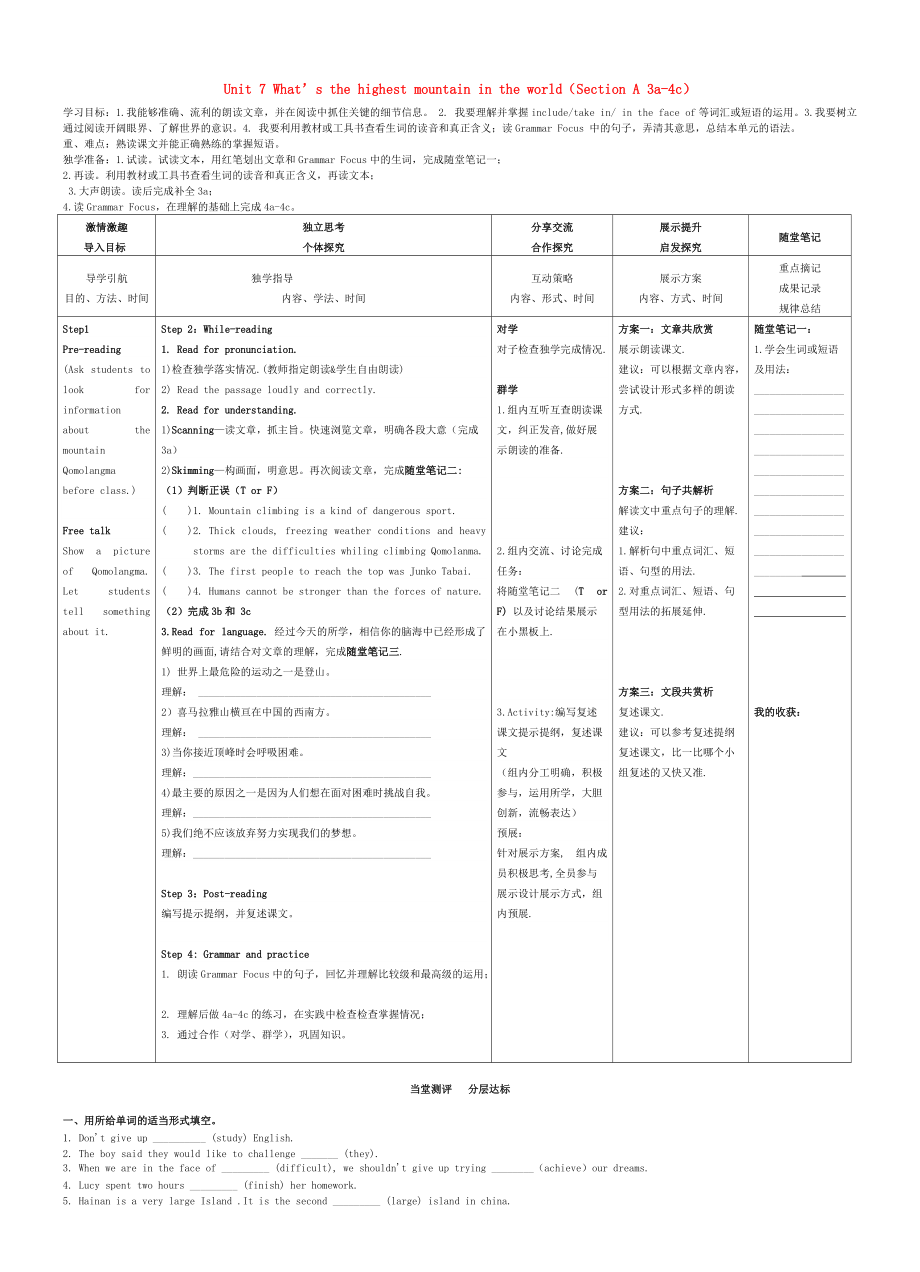《人教版八年級(jí)英語(yǔ)下冊(cè) Unit 7 Section A 3a4c導(dǎo)學(xué)案》由會(huì)員分享��,可在線閱讀�����,更多相關(guān)《人教版八年級(jí)英語(yǔ)下冊(cè) Unit 7 Section A 3a4c導(dǎo)學(xué)案(2頁(yè)珍藏版)》請(qǐng)?jiān)谘b配圖網(wǎng)上搜索�����。
1�、 精品資料
Unit 7 What’s the highest mountain in the world(Section A 3a-4c)
學(xué)習(xí)目標(biāo):1.我能夠準(zhǔn)確�、流利的朗讀文章,并在閱讀中抓住關(guān)鍵的細(xì)節(jié)信息�。?2. 我要理解并掌握include/take in/ in the face of等詞匯或短語(yǔ)的運(yùn)用。3.我要樹(shù)立通過(guò)閱讀開(kāi)闊眼界�����、了解世界的意識(shí)�。4. 我要利用教材或工具書(shū)查看生詞的讀音和真正含義;讀Grammar Focus 中的句子��,弄清其意思��,總結(jié)本單元的語(yǔ)法。
重�、難點(diǎn):熟讀課文并能正確熟練的掌握短語(yǔ)。
獨(dú)學(xué)準(zhǔn)
2�����、備:1.試讀���。試讀文本���,用紅筆劃出文章和Grammar Focus中的生詞,完成隨堂筆記一����;?
2.再讀。利用教材或工具書(shū)查看生詞的讀音和真正含義���,再讀文本;
?3.大聲朗讀�����。讀后完成補(bǔ)全3a���;
4.讀Grammar Focus����,在理解的基礎(chǔ)上完成4a-4c。
激情激趣
導(dǎo)入目標(biāo)
獨(dú)立思考
個(gè)體探究
分享交流
合作探究
展示提升
啟發(fā)探究
隨堂筆記
導(dǎo)學(xué)引航
目的���、方法���、時(shí)間
獨(dú)學(xué)指導(dǎo)
內(nèi)容、學(xué)法�、時(shí)間
互動(dòng)策略
內(nèi)容、形式�����、時(shí)間
展示方案
內(nèi)容����、方式、時(shí)間
重點(diǎn)摘記
成果記錄
規(guī)律總結(jié)
Step1
Pre-readin
3�、g?
(Ask students to look for information about the mountain Qomolangma before class.)
Free talk
Show a picture of Qomolangma. Let students tell something about it.
Step 2:While-reading
1. Read for pronunciation.
1)檢查獨(dú)學(xué)落實(shí)情況.(教師指定朗讀&學(xué)生自由朗讀)
2) Read the passage lo
4、udly and correctly.
2. Read for understanding.
1)Scanning—讀文章���,抓主旨��??焖贋g覽文章,明確各段大意(完成3a)
2)Skimming—構(gòu)畫(huà)面�,明意思。再次閱讀文章����,完成隨堂筆記二:
(1)判斷正誤(T or F)
(????)1. Mountain climbing is a kind of dangerous sport.
(????)2.?Thick clouds, freezing weather conditions and heavy storms are the difficulties whiling cli
5、mbing Qomolanma.
(????)3.?The first people to reach the top was Junko Tabai.
(????)4. Humans cannot be stronger than the forces of nature.
(2)完成3b和 3c
3.Read for language.?經(jīng)過(guò)今天的所學(xué)��,相信你的腦海中已經(jīng)形成了鮮明的畫(huà)面,請(qǐng)結(jié)合對(duì)文章的理解���,完成隨堂筆記三.
1)?世界上最危險(xiǎn)的運(yùn)動(dòng)之一是登山�����。
理解: ____________________________________________
2)喜馬拉雅山
6����、橫亙?cè)谥袊?guó)的西南方�����。
理解: ____________________________________________
3)當(dāng)你接近頂峰時(shí)會(huì)呼吸困難���。
理解:_____________________________________________
4)最主要的原因之一是因?yàn)槿藗兿朐诿鎸?duì)困難時(shí)挑戰(zhàn)自我����。
理解:_____________________________________________
5)我們絕不應(yīng)該放棄努力實(shí)現(xiàn)我們的夢(mèng)想��。?
理解:_____________________________________________
???????????????????
7�、??????????
Step 3:Post-reading
編寫提示提綱,并復(fù)述課文���。
?
Step 4: Grammar and practice
1. 朗讀Grammar Focus中的句子�����,回憶并理解比較級(jí)和最高級(jí)的運(yùn)用����;
2. 理解后做4a-4c的練習(xí)����,在實(shí)踐中檢查檢查掌握情況;
3. 通過(guò)合作(對(duì)學(xué)�����、群學(xué)),鞏固知識(shí)���。
對(duì)學(xué)
對(duì)子檢查獨(dú)學(xué)完成情況.
群學(xué)
1.組內(nèi)互聽(tīng)互查朗讀課文�����,糾正發(fā)音,做好展示朗讀的準(zhǔn)備.
2.組內(nèi)交流���、討論完成任務(wù):
將隨堂筆記二 (T or F)?以及討論結(jié)果展示在小黑板上.
3.Activity
8、:編寫復(fù)述課文提示提綱�,復(fù)述課文
(組內(nèi)分工明確,積極參與�����,運(yùn)用所學(xué)����,大膽創(chuàng)新,流暢表達(dá))
預(yù)展:
針對(duì)展示方案, 組內(nèi)成員積極思考,全員參與展示設(shè)計(jì)展示方式�,組內(nèi)預(yù)展.
?
方案一:文章共欣賞
展示朗讀課文.
建議:可以根據(jù)文章內(nèi)容,嘗試設(shè)計(jì)形式多樣的朗讀方式.
方案二:句子共解析
解讀文中重點(diǎn)句子的理解.
建議:
1.解析句中重點(diǎn)詞匯���、短語(yǔ)��、句型的用法.
2.對(duì)重點(diǎn)詞匯���、短語(yǔ)、句型用法的拓展延伸.
方案三:文段共賞析
復(fù)述課文.
建議:可以參考復(fù)述提綱復(fù)述課文�,比一比哪個(gè)小組復(fù)述的又快又準(zhǔn).
隨堂筆記一:
9、
1.學(xué)會(huì)生詞或短語(yǔ)及用法:
__________________________________________________________________________________________________________________________________________________________________
我的收獲:
10��、當(dāng)堂測(cè)評(píng) 分層達(dá)標(biāo)
一�、用所給單詞的適當(dāng)形式填空。
1. Don't?give?up?__________ (study)?English.?
2. The?boy?said?they?would?like?to?challenge?_______?(they).
3. When?we?are?in?the?face?of?_________?(difficult),?we?shouldn't?give?up?trying ________(achieve)our?dreams.
4.?Lucy?spent?two?hours?_________?(finish)?her?h
11�、omework.
5. Hainan is a very large Island .It is the second _________ (large) island in china.
6. Our teacher is as ________ (busy) as before.
7. He is ______________ (careful) among us.
8. Li Lei jumped ______ (far) than Jim.
9. The busier he is, the ________ (happy) he feels.
二、完成句子�����。
12����、1. The Yangtze River is______________________ (第三長(zhǎng)河)in the world.
2. The Atlantic is _______________________ ( 第二大洋)in the world.
3. Lin Tao is __________________________ (最懶的學(xué)生之一)in the class because he never gets to school on time.
4. Edison was_________________________(最偉大的發(fā)明家之一)in
13、 the world.
三�、句型轉(zhuǎn)換。
1. Flat A is more expensive than Flat B
Flat B is _____ __________ than Flat A.
Flat B is ________ _______ Flat A.
Flat B is not ______ _______ ______ Flat A.
2. I prefer math to English.
I like math ________ ________ English.
3. He is the tallest student in the class.
He is ________ _________ ________ ________ _________ in the class.
 人教版八年級(jí)英語(yǔ)下冊(cè) Unit 7 Section A 3a4c導(dǎo)學(xué)案
人教版八年級(jí)英語(yǔ)下冊(cè) Unit 7 Section A 3a4c導(dǎo)學(xué)案

